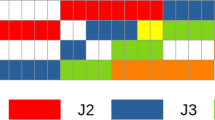Abstract
In this paper, we consider a flowshop scheduling problem with a special blocking RCb (Release when Completing Blocking). This flexible production system is prevalent in some industrial environments. Genetic algorithms are first proposed for solving these flowshop problems and different initial populations have been tested to find which is best adapted. Then, a method is proposed for further improving genetic algorithm found solutions, which consists in marking out recurrent genes association occurrences in an already genetic algorithm optimized population. This idea directly follows Holland’s first statement about nature observations. Here, proposed idea is that populations well adapted to a problem have an adapted genetic code with common properties. We propose to mark out these properties in available genetic code to further improve genetic algorithm efficiency. Implementation of this method is presented and obtained results on flowshop scheduling problems are discussed.
Similar content being viewed by others
References
Caraffa V., Ianes S., Bagchi T. P., Sriskandarajah C. (2001) Minimizing makespan in a blocking flowshop using genetic algorithms. International Journal Production Economics 70: 101–115
Chen C. L., Vempati V. S., Aljaber N. (1995) An application of genetic algorithms for flowshop problems. European Journal of Operational Research 80(2): 389–396
Dauzère-Pérès, S., Pavageau, C., & Sauer, N. (2000). Modélisation et résolution par PLNE d’un problème réel d’ordonnancement avec contraintes de blocage, 3ème congrès de la société Française de Recherche Opérationnelle et d’Aide à la Décision (ROADEF’2000) (pp. 216–217). Nantes, France.
Dauzère-Pérès, S., Pavageau, C., & Sauer, N. (2000 August). IP for modelling and solving an industrial hybrid flow-shop scheduling problem with blocking. In: Proceedings of 17th international symposium on mathematical programming (ISMP’2000). Atlanta, USA.
Della Croce F., Tadei R., Volta G. (1995) A genetic algorithm for the job shop problem. Computers and Operations Research 22: 15–24
Gonçalves J. F., Magalhăes Mendes de J. J., Resend M. G. C. (2005) A hybrid genetic algorithm for the job shop scheduling problem. European Journal of Operational Research 167(1): 77–95
Hall N. G., Sriskandarajah C. (1996) A survey of machine scheduling problems with blocking and no-wait in process. Operations Research 44(3): 510–525
Hejazi S. R., Saghafian S. (2005) Flowshop-scheduling problems with makespan criterion: A review. International Journal of Production Research 43(14): 2895–2929
Holger H. H., Stützle T. (2005) Stochastic local search: Foundations and applications. Morgan Kaufmann, San Francisco, CA, USA
Holland J. H. (1962) Outline for logical theory of adaptive systems. Journal of the association of computing machinery 3: 297–314
Iyer S. K., Saxena B. (2004) Improved genetic algorithm for the permutation flowshop scheduling problem. Computers and Operations Research 31: 593–606
Johnson S. M. (1954) Optimal two- and three-stage production schedules with setup times included. Naval Research Logistics Quarterly 1: 61–68
Martinez, S. (2005). Ordonnancement de systèmes de production avec contraintes de blocage, Ph.D thesis, IRCCyN. Nantes, France.
Martinez, S., Guéret, C., & Sauer, N. (2004). A simulated annealing method for the flow-shop with a new blocking constraint. In 20th European conference on operational research (EURO’04) (p. 27). Rhodes, Greece.
Martinez S., Dauzière-Pérès S., Guèret C., Mati Y., Sauer N. (2006) Complexity of flowshop scheduling problems with a new blocking constraint. European Journal of Operational Research 169(3): 855–864
Murata T. et al (1996) Genetic algorithm for flowshop scheduling problems. Computers and Industrial Engineering 30(4): 1061–1071
Nagano M. S. et al (2008) A constructive genetic algorithm for permutation flowshop scheduling. Computers & Industrial Engineering 55: 195–207
Nawaz M., Enscore E., Ham I. (1983) A heuristic algorithm for the m-machine, n-job flowshop sequencing problem. OMEGA. The International Journal of Management Science 11(1): 91–95
Oguz C., Ercan M. F. (2005) A Genetic algorithm for hybrid flow-shop scheduling with multiprocessor tasks. Journal of Scheduling 8: 323–351
Reeves C. R. (1995) A genetic algorithm for flowshop sequencing. Computers and Operations Research 22: 5–13
Ruiz R., Maroto C. (2005) A comprehensive review and evaluation of permutation flowshop heuristics. European Journal of Operational Research 165(2): 479–494
Salazar, D., Gandibleux, X., Jorge, J., & Sevaux, M. (2009). A robust-solution-based methodology to solve multiple-objective problems with uncertainty. In Multi objective programming and goal programming (Vol. 618, pp. 197–207). Berlin, Heidelberg: Springer. ISBN:978-3-540-85645-0 (Print), 978-3-540-85646-7 (Online).
Sauvey, C., & Sauer, N. (2009a). Initial populations tests for genetic algorithm flowshop scheduling problems solving with a special blocking. In INCOM’09: Proceedings of 13th IFAC symposium on information control problems in manufacturing, June 3–5, 2009, Moscow, Russia, pp. 1961–1966.
Sauvey, C., & Sauer, N. (2009b). Heuristique pour la résolution des problèmes d’ordonnancement de type flowshop avec blocage RCb, ROADEF’2009. France: Nancy, nº19.
Siarry, P., & Michalewicz, Z. (2007). Advances in metaheuristics for hard optimization, Springer-natural computing series.
Wang L., Zhang L., Zheng D. Z. (2006) An effective hybrid genetic algorithm for flow shop sheduling with limited buffers. Computers & Operations Research 33: 2960–2971
Yuan, K., & Sauer, N. (2007). Application of EM algorithm to flowshop scheduling problems with a special blocking, IESM’07. Beijing.
Author information
Authors and Affiliations
Corresponding author
Rights and permissions
About this article
Cite this article
Sauvey, C., Sauer, N. A genetic algorithm with genes-association recognition for flowshop scheduling problems. J Intell Manuf 23, 1167–1177 (2012). https://doi.org/10.1007/s10845-010-0422-3
Received:
Accepted:
Published:
Issue Date:
DOI: https://doi.org/10.1007/s10845-010-0422-3




